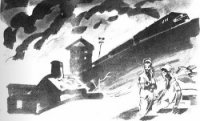Operation Nemesis: The Assassination Plot that Avenged the Armenian Genocide - Bogosian Eric (мир книг .txt) 📗
By the end of January, Tehlirian was consumed with nerves and frustration. It was time to act! Why were they waiting? He was obviously running out of strength and out of time. If he could not discover Talat’s whereabouts, then at least he could attack Shakir and Nazim, two mass murderers. Tehlirian lobbied his co-conspirators. “Let’s just kill them. They are as bad as Talat.” Shahan Natali refused to give the go-ahead. It had to be Talat, because killing Talat assured a highly publicized trial, and such a trial would reveal to the world what the Turks had done.
Around this time, Hrap heard rumors that a meeting of the former CUP leaders would soon be taking place in Rome. If the rumors were true, Talat would be forced to emerge from hiding and reveal himself when he boarded the train for Italy. The gathering of the Ittihad leadership-in-exile was confirmed in an article in an Italian Fascist newspaper. Shahan Natali prepared to go to Rome but had trouble getting his paperwork together. He missed the train that would have gotten him to Italy in time to stake out the meeting. Boarding a train two days later, Natali found himself seated in a coach with Turks who had no notion that this man in Western dress could comprehend their every word. He understood that others would come to see these Turks off before the train left the station.
Natali’s and Tehlirian’s accounts of what happened in that train station do not jibe perfectly, but they do agree on the central point.24 A man arrived at the train platform to see the others off (one of whom Natali would later identify as Bedri Bey, the notorious former police chief of Constantinople and cohort of the assassinated Megerdichian). This man, the “Man of the Station,” as Natali labels him, was heavyset and carried a cane. But more important was this man’s obvious superior status relative to the men surrounding him.
Tehlirian, who was at the station to see Natali off, observed the heavyset man carefully. Who was he? Could this be our man? Could this be Talat? But he was clean-shaven; he lacked Talat’s signature thick black mustache. As the round-faced man approached several “students” on the sidewalk, the group sprang to life, arranging themselves like soldiers in an honor line. One kissed the large man’s hand and said, “They are already inside, pasha.” The heavyset man stepped up to the train and, with his cane, rapped on Bedri Bey’s window in a farewell gesture. He then rejoined the others, and they all backed away as the train slowly chugged out of the station. The group moved toward the exit, allowing the man they called “pasha” to take the lead.
Hazor and Haigo appeared. “Is that him? Who is that?”
“They called him ‘pasha’ ”
“Every dog of the days of the deportations is called ‘pasha’ now.”
The Nemesis agents trailed the group and noticed that the entourage lagged a few steps behind two “leaders,” the heavyset man with cane and “a dark-faced one.” Tehlirian tried to make sense of what he was seeing. The one they called “pasha” was large and powerfully built. His thick trunk was right for Talat. But the face… Collecting his thoughts, Tehlirian let his fellow spies walk ahead. The route passed the Tiergarten, now a familiar neighborhood, one that the agents had traversed several times while following their targets. The three “students” accompanying their superiors bowed deeply, said their good-byes, and moved off.
The two men, “heavyset” and “dark face,” were standing before a comfortable apartment building: number 4 Hardenbergstrasse. Hazor and Haigo sidled up alongside Tehlirian. “We’ve been here before. On this street!”25
“Yes.” The young Armenians shrank back into the shadows of the leafy boulevard and watched the building for over an hour. Neither suspicious individual reappeared. Tehlirian was excited. He had not felt this way since the retreat from Erzinga.
Was the man living at 4 Hardenbergstrasse Talat Pasha? It must be! How could they determine the truth? As a foreign national, Talat would have had to register with the police, but any visit to the local precinct house to make inquiries would bring suspicion upon the Nemesis gang. Besides, how likely was it that Talat was living in Berlin under his real name? One of the men ran up to the door to take a peek at the brass plate affixed there. In Arabic script was written the name Ali Salih Bey.
The following day, Vaza rang the doorbell at number 4 Hardenbergstrasse and introduced himself as the representative of a Swiss insurance company looking for a room to rent. The bored landlady, welcoming the distraction, invited the young Armenian in. “How many rooms do you need?”
“Only one.”
The landlady replied that the current tenant still had three months on his lease, then cheerfully explained that three people were living there: a merchant, his beautiful wife, and a third man. The merchant was a Turkish businessman by the name of Ali Salih Bey. She explained that “Salih” had not signed the rental contract himself. Rather, the arrangements had been taken care of by the secretary at the Turkish embassy. Vaza smiled. “He must be an important man.”
“Oh yes. He is very well off. But perhaps you can come to an agreement with my tenant? He has a lot of room.”
Vaza demurred. “That would be impossible. I cannot rent in the building in which a Muslim keeps his wife.” Anxious to return to his cohorts, Vaza thanked the chatty landlady and departed.
When Vaza delivered the new information, it threw Tehlirian into a funk. This news was tantalizing but inconclusive. No businessman would have had a room rented for him by the consulate. If this was indeed Talat, it was vital that they act quickly, before he could escape. But then where could Talat escape to? Another city? If he had not joined the others in Rome, that must mean that his presence was needed here. His thoughts chased one another. Talat must be planning something. It was necessary that he be present here as a leader. His collaborators could not be brought from place to place… But could he not change his residence? He could, especially if he was suspicious. Did we make him suspicious?
In his memoirs Tehlirian clearly states that he was ready to kill the man living at 4 Hardenbergstrasse. He was possessed, plagued by morbid dreams in which he wandered landscapes littered with bodies or in which his mother appeared carrying her head in her hands. He fantasized enormous armies of skeletons being led by famous dead Armenian heroes like Murad of Sepasdia, the legendary Tashnag fighter who had also fought in the Caucasus and western Armenia with Tehlirian, and was killed in Baku in 1918.
Tehlirian would wake early every morning and stake out the house on Hardenbergstrasse. He would follow the heavyset man as he traveled from one residence to another, one appointment to another. It soon became clear to Tehlirian that “Salih” stuck to a consistent schedule, routinely leaving his house between ten and eleven in the morning every day. Tehlirian studied the photographs of Talat that Armen Garo had handed him in Boston. He would stare at the photos until his head ached.
In frustration, Tehlirian scratched off the prominent mustache in Talat’s portrait. Lacking the mustache, the face was transformed into an entirely different visage. This was the man they had seen at the train station. This was the man Tehlirian had been following. This was Talat Pasha. Yet when he presented his evidence to his comrades, they remained unconvinced. This was not proof, and murdering an innocent man would be unconscionable. “We might lose him by delaying, but it would be worse if we are wrong.”
Tehlirian and his band had no way of knowing that British intelligence knew exactly where Talat Pasha was living. Eighteen months earlier, in September 1919, Aubrey Herbert, a former diplomat (and as such connected to intelligence operations), had received a letter from Talat. Talat had known Herbert when he had been a member of the British delegation stationed in prewar Constantinople, and the two men had become friendly while attending the obligatory social functions. After the war, when Talat wanted to send a message to British policy makers, he thought of Herbert as someone he could trust. In a September 1919 letter (written in French), Talat requested an opportunity to meet with Herbert so that he could explain Turkey’s position vis-a-vis Britain, adding that he also wanted to explain any supposed wrongdoing against the Armenians.




